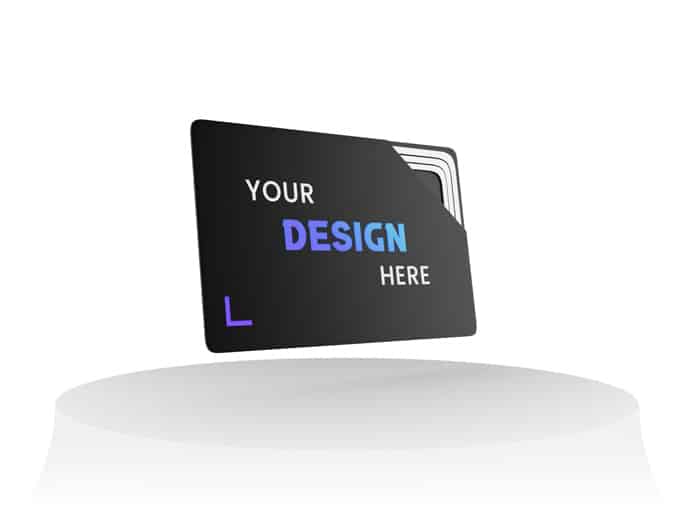
Why is a business card essential in the professional world?

In this article, you’ll discover in-depth explanations of the different types of business cards, their role, and why you should have one made that perfectly reflects your image.
Indeed, you’ll discover that it’s an essential part of your professional branding!
What is a business card?
Business cards are generally printed documents on which the owner’s contact details are written. Most of the information on a business card includes postal address, occupation, name, telephone number and e-mail address.
However, you can also add a logo and your Facebook, Instagram and LinkedIn details, not forgetting your website address if you have one!
You can also include a slogan or catchphrase that defines your mission.
On the other hand, a business card is not the right place for a long text: all information must be precise but concise.
And don’t forget that the smaller the font, the more difficult it will be to decipher, especially for people with visual impairments.
What are the different types of business card?
Classic business cards
Initially, business cards were invented as a means of signalling your presence during a courtesy call, before being “recovered” by the corporate world.
They represent the traditional model, and can be printed in a variety of formats: square or rectangular, or with rounded corners. They can also be printed with 3D varnish or recycled paper.
Folded business cards
Folded business cards have long been a fashionable item, especially for companies who have used them as a marketing medium. They are usually designed in the form of a leaflet, and enable companies to share additional information.
It’s fair to say that folded business cards are mainly used for advertising to promote a company’s activity.
Virtual business cards
In addition to classic or folded business cards, virtual cards, also known as digital cards, are on the rise.
They play the same role as all other business cards.
But what makes them so special is that you don’t need to own several: just one is enough, as it will transmit all your contact details, as well as documents or links to a website, to your contacts’ smartphones.
So these are not physical cards, but tools carrying a qr-code or digital chip.
The importance of a business card?
A business card is an excellent way of making yourself known and expanding your circle of acquaintances.
In the professional and business world, business cards are first and foremost a way of making yourself known and expanding your circle of contacts.
Indeed, company directors, businessmen, company managers and entrepreneurs are all people who have to meet a lot of potential partners and customers. The business card is therefore the best way for them to easily pass on their contact details, in a highly professional manner.
What’s more, your business card allows you not only to share your contact details and the best ways to get in touch with you, but also to say a little more about your business, your services or products and, of course, your company.
As soon as you hand someone your business card, you’re giving them a direct indication of where they can find you and how to get in touch with you without delay.
What’s more, your business card gives access to your pages on social networks: an essential way of easily expanding your audience.
And with a digital business card, you can share direct links that will take your contacts to a website or download documents!
Business cards are basic professionalism!
The phrase “Here’s my business card” is familiar to all professionals. In fact, there’s nothing more disastrous than when someone asks for your business card, and you leave them hanging because you don’t have one with you…
If you have business cards in your possession, wherever you are, you’ll be seen as an important and reliable person in the eyes of your prospects. Giving out a nice business card, or sharing information via an e-card, always brings real benefits in terms of professional recognition: so don’t forget it!
Business cards are a free source of advertising for your company
To understand why some companies invest so much in their business cards, we mustn’t lose sight of the fact that this document reflects their company’s image.
In fact, the business card is an essential communication tool: it contains information about the company, the employee and his or her functions, while at the same time constituting a real and easy-to-use promotional tool.
Business cards also enable the company to disseminate value and raise its profile. In this way, over time, the company will gain in notoriety and increase the number of its customers.
Business cards can therefore represent a great source of direct marketing, in addition to the printing of T-shirts, caps and key-rings…
Business cards are a simple and effective way of reaching a wider or narrower audience, without having a disproportionate financial impact on the communications budget.
Business cards save time
Nothing is more precious than time in the business world.
We’re all subject to numerous meetings, appointments and telephone exchanges throughout the day.
However, as a businessman, you’re bound to meet people with whom you’d like to have an in-depth conversation, but circumstances won’t allow it.
With a digital or printed business card, you won’t have to search for a pen to write down the information you’re looking for on a piece of paper: all you have to do is hand the other person your business card.
What’s more, a business card is less likely to get lost than a paper note, and is much more resistant because it’s often made from thick cardboard.
Of course, with a digital business card, this is no longer a problem, since important data is transmitted directly to your contact’s smartphone: no risk of losing your contact details!
Why should your business card be perfect?
The business card represents your company’s image, and you as a professional.
Your business card is therefore your primary means of communicating with new partners and prospects.
In a way, it’s almost a simplified presentation of your company.
There are, of course, specific instructions to be followed for the correct layout of each piece of information, as well as your services.
A potential customer who sees your business card needs to know at a glance whether or not your company is competent to meet their needs.
So, if your card is well optimized, it will make a favorable impression on your interlocutor. For example, an effective business card should contain a small blank space so that the cardholder can leave a short written message or special information should the need arise.
So it’s imperative to optimize the design so that the result is perfect!
How to choose your business card design?
You’re probably wondering which card format will suit you best? Or how to choose the card design that will help you complete your presentation?
There are many choices available.
If you’re a company director, we’d recommend folded business cards, as they enable you to showcase your profile and your company’s assets.
If you’re a sales executive, manager or engineer, you’re better off with a classic card, which will enable you to widen your circle of partners: in business, you always need to know people!
On the other hand, if you’re called upon to hold meetings or have online conversations, we recommend the digital model, which makes it much easier to transmit virtual information.
In conclusion, you’ve understood that it’s absolutely essential to have a classic or digital business card that reflects your image, enables easy contact and, if necessary, directs your contact to useful resources for the development of future activities or professional links.
Written by Camille BODET
The digital business card is a real ally for professionals wishing to promote their business effectively and instantly. In the...Lire la suite
VKARD is an innovative and effective solution to help all professionals stand out from the crowd and reinforce their brand...Lire la suite
If you prepare properly for a job interview, you'll have every chance of winning over the recruiter and getting the...Lire la suite
LinkedIn is a world-renowned business platform, and for good reason! Thanks to its many networking options, LinkedIn is the tool...Lire la suite
Find out how Leexi AI optimizes the management of videoconferences and business calls, saving time and improving efficiency.
In the professional sphere, it's vital to know how to convey certain strong values in order to stand out and...Lire la suite
Mastering the art of conversation is a real asset! By mastering the subtle art of conversation, you'll be able to...Lire la suite
Are you taking part in a trade event and want to do everything you can to make a good impression?...Lire la suite
CRM (Customer Relationship Management) represents a genuine corporate strategy for managing business contacts. This popular tool for professionals is in...Lire la suite
At a time when the professional world is in a perpetual state of competition, we might wonder what place altruism,...Lire la suite















